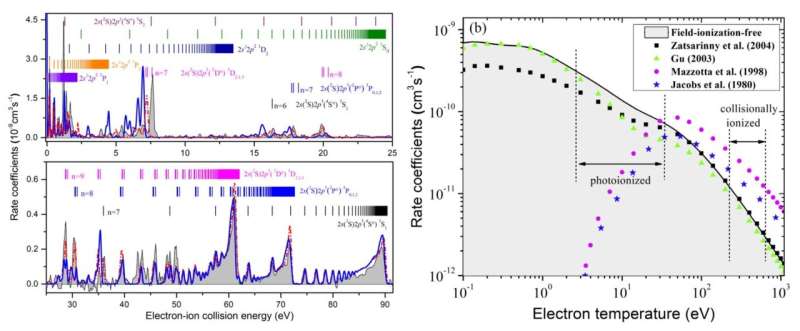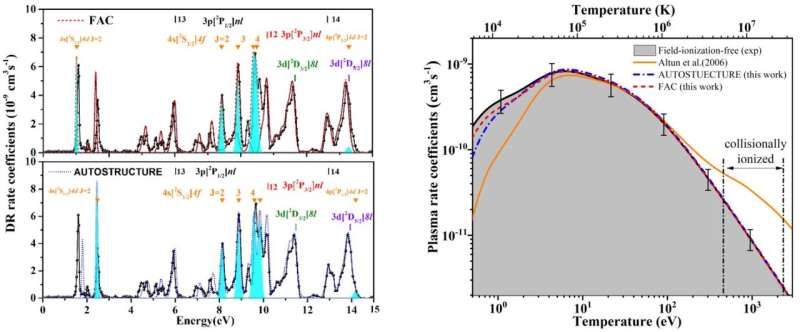Researchers obtain new results on dielectronic recombination precision spectroscopy

Researchers at the Institute of Modern Physics (IMP) of the Chinese Academy of Sciences (CAS) and their collaborators recently obtained new results on dielectronic recombination precision spectroscopy. The results were published in the Astrophysical Journal and Physical Review A.
More than 95% of the visible matter is in plasma state in the universe. Atomic processes in the plasma environment are involved in the fundamental studies of stars, supernova remnants, galaxies, planetary nebulae, X-ray binaries, and active galactic nuclei. With the development of X-ray telescopes, scientist can obtain the key information of celestial plasmas by using the observation data of space observatory combined with relevant theoretical mode, and thus they are able to deeply understand the formation and evolution of celestial bodies.
Electron-ion recombination is one of the most important collision reactions in the plasma environment. Precise electron-ion recombination rate coefficients are the most basic input parameters for astrophysical and fusion plasma modeling. The radiation lines in dielectronic recombination (DR) process can be used as an effective probe for the electron temperature and density diagnostic in plasmas.
The heavy ion storage ring combined with the electron-cooler device provides an unique experimental platform for the DR precision spectroscopy experimental research of highly charged ions. Usually, the storage ring DR experiments have extremely high energy resolution, and the relative energy between the electron and ion beams can be precisely detuned in a very broad energy range, which provide the only method to measure the low energy DR processes, especially for the DR resonances near the ionization threshold.

Researchers from IMP, together with researchers from the University of Science and Technology of China, Fudan University and University of Strathclyde, have successfully performed the DR precision spectroscopy of C-like calcium and Na-like Krypton at the heavy-ion storage ring (HIRFL-CSRm) in Lanzhou, China.
They obtained the absolute DR rate coefficients of 40Ca14+ and 86Kr25+ within the energy range of 0-90 eV, and then compared them with the calculation results by Flexible Atomic Code and AUTOSTRUCTURE codes carefully.
In addition, the plasma rate coefficient that can be used for plasma modeling was obtained and compared with the previous recommended theoretical data.
For Ca14+ ions, it is found that the calculated result of the rate coefficient of the photoionization plasma temperature interval used for theoretical modeling was two orders of magnitude smaller than the result of this experiment. For Kr25+ ions, scientists found that the electronic correlation has very important contributions in the DR spectrum at low energy range, and the strong mixing effect between low energy DR resonances must be considered.
The DR precision spectrum obtained in this work can not only be used to study the energy level structure of highly charged ions and thereby test the theory, but also provide high-precision benchmark data for the diagnosis and modeling of astrophysical and fusion plasmas.
More information: Z. K. Huang et al. Absolute rate coefficients for dielectronic recombination of Na-like Kr25+, Physical Review A (2020). DOI: 10.1103/PhysRevA.102.062823
W. Q. Wen et al. Rate Coefficients for Dielectronic Recombination of Carbon-like 40Ca14+, The Astrophysical Journal (2020). DOI: 10.3847/1538-4357/abc1e4
Journal information: Astrophysical Journal
Provided by Chinese Academy of Sciences





















